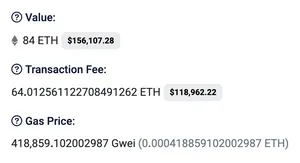The amount is owed by affiliate OneTeam Partners. In April, Sportico reported that sports NFT platform Dapper Labs had discussed restructuring its deal with the NFL and NFLPA due to an extremely rocky year. So too had DraftKings, which had signed a deal with the NFLPA for its "Reignmakers" player trading card NFTs.
NFL labor union is out almost $42 million thanks to crypto collapse
"Charity NFT project" by supposed cancer patient raises $117,000 with stolen art before being exposed as a fraud
Several hours later, the project creator deleted her Twitter account, and crypto sleuth zachxbt unearthed evidence that the pixel art she had been selling as NFTs had been stolen from various others. Altogether, the "Pixel Penguins" NFT project she promoted raised around 63.5 ETH (~$117,000).
Wang later apologized for promoting the scam, claiming that he had tried to do due diligence but had been in contact with her for over a year, and had spoken on the phone with someone claiming to be her art teacher. However, zachxbt wrote, "Seems some people called it out last year. Not sure how much he actually 'verified'".
MoonPay executives pocketed $150 million raised from Series A
According to The Information, MoonPay never disclosed that $150 million of the Series A funding was used to purchase shares from insiders including Soto-Wright, and never went to the company. Several weeks after the funding round, Soto-Wright purchased a $38 million Miami mansion.
Bybit exits Canada
In June 2022, Bybit settled a complaint from the Ontario Securities Commission for operating an unregistered platform and offering unregistered securities to Ontarian investors. The company disgorged CA$2.5 million (US$1.9 million) as result. At the time, the OSC stated that Bybit was working to come into compliance with the OSC's requirements.
Apparent whitehat exploits El Dorado Exchange, claiming developers built in a backdoor to steal user funds
The attacker promised to return all funds, minus a 10% "white hat fee", if the developers "admit to manipulating the prices", and also offered to disclose other vulnerabilities they claimed to have found in the project.
The project founders wrote in response: "Yes we acknowledge making an ill-advised decision to manipulate the price. However our intention was to blacklist those who had previously exploited the system, fully aware that all transactions are recorded on the blockchain. We did not aim to misappropriate users funds as this would leave a traceable record. We will promptly remove the problematic bomb contract."
The exploiter began returning funds shortly afterwards.
BKEX crypto exchange halts withdrawals due to money laundering investigation
The exchange offered no estimate of when withdrawals might be re-enabled.
Jimbos Protocol exploited for $7.5 million
After the attack, Jimbos Protocol tweeted "We are aware of the exploit regarding our protocol and are actively in contact with law enforcement and security professionals. We will release further information when possible." They also sent an on-chain message to the exploiter, offering to stop all investigations if the hacker returns 90% of the stolen funds.
Nigerian crypto trading app Patricia suffers multimillion dollar theft, freezes withdrawals
The stolen ₦2 billion would have been worth around US$4.8 million based on the value of the Naira at the time of the theft.
Malfunctioning bot costs Poo Finance token hunters $440,000
Coinone employees "admit to facts" in case regarding token listing bribes
Four executives were arrested in connection to the investigation in April, under suspicion that they had received ₩2.4 billion (~$2.2 million) in bribes in exchange for listing dozens of coins.
Coinone is one of the most popular South Korean cryptocurrency exchanges. In July 2022, it was among the seven exchanges raided by Korean authorities in the wake of the Terra/Luna collapse, as the country began applying harsher scrutiny to crypto platforms.
Crypto payments firm Unbanked to shut down
However, Unbanked also let on that their closure was more related to an investment falling through than to any regulatory issues. The company wrote that a $5 million investment was never delivered, and that the company had "exhausted all options" funding-wise.
- "Unbanked will be winding down", Unbanked
DCG shutters TradeBlock subsidiary
The decision comes amidst broader troubles for DCG, which is embroiled in the bankruptcy proceedings of its Genesis subsidiary. Earlier in May, DCG missed a $630 million payment to Genesis.
Hackers steal around $170,000 after compromising Steve Aoki's Twitter account
The scam was helped along by ben.eth, a Twitter personality who retweeted one of the tweets by the compromised account in which Aoki appeared to endorse a token created by ben.eth. According to crypto sleuth zachxbt, multiple followers of ben.eth were impacted by his retweet, which zachxbt characterized as "quote tweet[ing] a phishing scam posted by the compromised @steveaoki account for clout". Ben.eth ultimately promised to reimburse his fans who lost money thanks to his tweets.
Transactions stuck on Multichain blockchain bridge due to "force majeure"
Meanwhile, rumors swirled that the Multichain team had been arrested by Chinese police, though there doesn't seem to be much corroborating evidence of this.
The issues and the rumors sparked a drop in token price of around 30%. Several large parties also appeared to distance themselves from the project and its token, including the Fantom Foundation, which withdrew 449,740 MULTI (~$2.4 million) in liquidity on SushiSwap.
On May 31, Multichain issued a statement that "we are currently unable to contact CEO Zhaojun and obtain the necessary server access for maintenance", and wrote that even more bridges were being impacted by the same issues as in the previous week.
Morgan DF Fintoch likely exit scams for around $31 million
On May 23, crypto sleuth zachxbt tweeted that the project appeared to have executed their exit scam, bridging around 31.6 million Tether to various addresses. Platform users began to report that they could not withdraw funds.
Brand new $CS token exploited for almost $700,000
Tornado Cash DAO suffers hostile takeover
The attacker has already drained locked votes and sold some of the $TORN tokens, which are governance tokens that both entitle the holder to a vote but also were being traded for $5–$7 around the time of the attack. The attacker has since tumbled 360 ETH (~$655,300) through Tornado Cash to obscure its final destination. Meanwhile, $TORN plummeted in value more than 30% as the attacker dumped the tokens.
The attacker now has full control over the DAO, which according to crypto security researcher Sam Sun grants them the ability to withdraw all of the locked votes (as they did), drain all of the tokens in the governance contract, and "brick" (make permanently non-functional) the router.
Croatian cryptocurrency investment company BitLucky reportedly collapses; more than $75 million allegedly missing
Some have expressed the opinion that BitLucky was a Ponzi scheme all along, given the unreasonable promises of 5–25% monthly returns. The editor of a crypto news outlet also expressed that "there was a 'line of [red] flags'", including that Burazer never wanted to appear in the media or have his picture shown online.
- "Najveća domaća kripto prevara? Riječanin klijentima uzeo 70 milijuna €. Upravo je u bijegu", Jutarnji list (in Croatian)
WDZD Swap exploited for $1.1 million
- "DeFi protocol WDZD Swap exploited for $1.1M: CertiK", CoinTelegraph
Around $110 million "stuck" in Aave protocol on Polygon due to a bug that can't be fixed for a week
The funds are not at risk, but it will take at least a week before the funds are unstuck because any code change requires a DAO vote. "Considering governance times, if approved, the fix will be applied in approximately 7 days from now: 1 day of delay to start voting, 3 days of voting, 1 day of timelock on Ethereum, and 2 extra days of timelock on Polygon," explained a post by Bored Ghost Developing, a contributor to Aave.
Phishing-as-a-service company "Inferno Drainer" steals assets nominally worth $5.9 million in three months
One Inferno Drainer victim lost assets worth around $417,000. They later sent an on-chain message to the thief, writing: "you are ruining my life and for me this money was a lifetime's work, I won't have enough my family..." They asked the attacker to return 50% of the funds stolen from them, offering to not report the scammer to Interpol and other authorities in return, and even offering to "sign a contract allowing you to use legally the stolen crypto".
Grumpy Cat trademark owner sends cease and desist via NFT over unauthorized "Grumpy Cat Coin"
However, Grumpy Cat's owner owns trademarks associated with Grumpy Cat, and it seems she has become aware of the coin. On May 18, she minted an NFT and transferred it to the Grumpy Cat Coin deployer address. The NFT image is a copy of a cease and desist letter representing Grumpy Cat Limited. The letter describes the coin offering as a "blatant and willful infringement of our client's trademark rights", and insists that the coin creators stop all activities related to the coin offering or face legal action. The letter also mentioned that the URL of the project website — grumpycat.fyi — was a violation of the Anti-Cybersquatting Consumer Protection Act. The project subsequently changed its domain to gccoin.fyi in an apparent effort to avoid this issue.
Simultaneously, a message addressed to holders of the Grumpy Cat Coin was posted to Grumpy Cat's Twitter account, describing the token as a "desperate, sad attempt to scam unwitting traders" by "SlumDoge Millionaire and their cohorts".
Coin Cafe to pay $4.3 million restitution after instituting high fees without informing customers
The New York Attorney General found that Coin Cafe's misleading fee structure was still in effect even after the company obtained a BitLicense from the Department of Financial Services.
Swaprum decentralized exchange rug pulls for almost $3 million
The project had been audited by blockchain security firm CertiK, and displayed the "audited by CertiK" badge on their website. This added to criticisms of CertiK, who have come under fire for auditing multiple projects that later turned out to be scams. CertiK defended themselves, writing that, "As an auditor, we cannot force projects to implement our recommendations, but we can clearly and publicly call out vulnerabilities where we find them". They argued that they had identified vulnerabilities within their audit that ultimately allowed for the exploit, including the high degree of centralization and the upgradability of the smart contracts.
Sam Altman's Worldcoin project incentivizes a black market for biometric data taken from people in developing nations
Sam Altman's Worldcoin project, a dystopian effort to use chrome orbs to scan the irises of people (often in developing nations) in exchange for vague promises of crypto compensation, is encountering even more difficulties. In April 2022, BuzzFeed News and MIT Technology Review both published in-depth reporting on some of the technical and ethical issues the project has run up against.
Now, the project is facing reports that people in China, who are not allowed to sign up legitimately, have been purchasing iris scans from individuals in Africa and Southeast Asia in order to circumvent the restriction. According to the news outlet BlockBeats, Chinese individuals have been engaging in "eyeball speculation": buying biometric data scanned en masse from villagers in Cambodia, Kenya, and elsewhere by people who then sell it for $30 or less, allowing the buyer to receive the associated Worldcoin payout (currently ~$20).
Worldcoin has said they are rolling out various measures to try to discourage this activity, including changing the in-person sign-up process. However, the project acknowledged that they have not figured out how to prevent this, writing: "Despite these precautions, it is important to acknowledge that they do not entirely safeguard against collusion or other attempts to bypass the one-person-one-proof principle. To address these challenges, innovative ideas in mechanism design and the attribution of social relationships will be necessary."
Former Fabric CFO accused of siphoning $35 million into his crypto startup and losing it all
According to the grand jury indictment, Shetty planned to put the funds into cryptocurrency positions that "could have yielded returns of 20 percent or more annually", and planned to return 6% to Fabric, keeping the difference. This so-called "investment" contradicted the conservative investment strategy that Shetty had helped to draft for Fabric, and he concealed both the existence of the transfer and his involvement with HighTower.
Shetty "lost virtually all of [Fabric's] money" "within a matter of weeks", at which point he fessed up to Fabric. Shetty had placed all of the funds into protocols based around the Terra stablecoin, which collapsed dramatically only a month later.
Shetty has pled not guilty, and has been released on bond.
Traders lose more than $15 million to phishing website impersonating crypto exchange HitBTC
hitbt2c.lol instead of hitbtc.com approved transactions to swap their crypto assets, only to find the site drained their wallets.South Korean legislator Kim Nam-kuk resigns over allegations of improper crypto dealings
Other concerns arose regarding the discovery of the assets. Some were worried about possible conflicts of interest, particularly in relation to Kim's 2021 proposal of a bill that would delay taxation of crypto profits. Others were worried about the source of the funds used by Kim for crypto trading; Kim claims he did not receive money from anyone to use for trading, and obtained the money through the sale of stocks.
On May 10, the Democratic Party recommended Kim sell his crypto holdings, and launched an investigation. Kim said later that day that he would perform the sales, and "transparently disclose data to the investigation team and undergo the inquiry faithfully".
On May 14, Kim resigned from the Democratic Party "for a while", continuing to deny the allegations but expressing wishes to not burden the party and its members over the controversy.
The subsequent day, Korean authorities raided the offices of Korean crypto exchanges Bithumb and Upbit in connection to the scandal, seeking transaction records and other information. Kim was reported to use those services for his crypto wallets.
a16z-backed Mecha Fight Club NFT robot cockfighting game put on ice as maker pivots to AI
Now, the company has announced that the project will be paused "for the indefinite future", blaming "lack of clarity" and "regulatory confusion" in the United States. The company simultaneously announced "SOL 4 Cocks", in which they will repurchase the Mecha Fight Club NFTs for 18 SOL (~$380). The NFTs had originally minted for 6.969 SOL (~$290 on mint date).
Irreverent Labs' website and social media now describe the company as an AI firm building "text to 3D and video prediction tools that facilitate the creation of AI-generated 3D content".
Fractional NFT ownership platform Tessera shuts down
The decision was announced only a few weeks after the US Department of Justice announced charges against a group of individuals including Chorlian. Chorlian was charged with conspiracy to commit securities price manipulation and wire fraud in connection to an alleged scheme to manipulate the market for the HYDRO crypto token. If convicted, Chorlian faces a maximum of five years in prison.
- Tweet thread by Andy Chorlian
- "Paradigm-Backed NFT Ownership Platform Tessera is Shutting Down", CoinDesk
- Press release by the Department of Justice
Citing regulatory concerns, Bakkt delists 25 of 36 crypto tokens on newly acquired Apex Crypto
A spokesperson stated that the delisting was a reaction to "the most up-to-date regulatory guidance and the latest industry developments". The decision is likely related to mounting industry pressure, and statements from SEC Chair Gary Gensler that most crypto assets are securities.
Binance exits Canada
This is only the latest in a string of events involving regulatory pressure on Binance. In April, Binance canceled the acquisition of the bankrupt Voyager platform by its Binance.US arm, citing a "hostile and uncertain regulatory climate in the US". This move came shortly after a March lawsuit from the US CFTC against Binance and its CEO. Elsewhere, Binance closed its derivatives arm in Australia in April, citing issues with the Australian securities regulator.
Aragon DAO faces governance crisis
In June and October 2022, the Aragon DAO — that is, all holders of the $ANT token or (later) their delegates — voted on several proposals supporting a move to place the Aragon treasury under DAO control. The treasury is a pool of crypto assets currently priced at around $174 million. However, the tokens continued to remain under control of the Aragon Association.
On May 9, 2023, the Aragon Association announced that they would not be following through with the treasury change, and instead would be "repurposing the Aragon DAO into a grants program". They attributed the decision to "coordinated social engineering and 51% attack" on the DAO that began shortly after a small portion of the treasury assets were transferred.
A week before the announcement, Aragon also banned a group of token holders from the group's Discord channel. Aragon characterized the group as appearing "coordinated" and alleged the group was "engaging in harassment". They claimed the group were members of the "Risk Free Value Raiders", which they described as "a sophisticated, well-resourced, and coordinated group of actors that target crypto projects with an imbalance between the value of their token and treasury". They also accused the group and its members of coordinating governance attacks on other DAOs, including Invictus DAO and Mango Markets. Aragon wrote that they believed the RFV Raiders were aiming to "[extract] value from Aragon for financial profit" rather than pursue the DAO's goals of supporting developers building DAO infrastructure.
One of the banned members told a different story, publishing and later taking down a statement in which he claimed that they were trying to get answers to questions about why the Aragon team was so slow to enact the DAO vote. "We find these bans, failure to empower the community with treasury transfers, and overall lack of transparency to be frustrating and against the ethos of both what DAOs are meant to be and what Aragon team members have repeatedly said they stood for. However, these actions have become a common pattern for Aragon," he wrote.
On May 11, Aragon apologized for how they handled the crisis, unbanned the banned Discord members, and announced that they would "keep following a gradual [treasury] transfer approach, making sure it aligns with the mission of the project", but continued to characterize the members as attackers and reiterated that "we won’t stand for hostile and coordinated attacks".
Blockchain-based diamond tracking firm Everledger collapses
Everledger had in the past raised US$37 million in funding. AUD$3 million (~US$2 million) of that funding came from the Australian government's blockchain grants program in 2021.
- "Government and Tencent-backed Aussie blockchain firm collapses", Australian Financial Review
Bittrex files for bankruptcy
Bittrex used to be a much larger presence in the US, enjoying more than 20% of US market share in 2018. It has since dropped to below 1%.
The entity that filed for bankruptcy in the US is Bittrex, Inc., which is separate from Bittrex Global. "This announcement does not impact Bittrex Global, which will continue operations as normal for its customers outside the U.S.," said a Bittrex spokesperson.
Ethereum user pays 64 ETH ($118,000) transaction fee on 84 ETH ($155,000) swap
- Tweet by Whale Alert
- Ethereum transaction on Etherscan
Deus Finance suffers third hack
In the most recent hack, around $7 million was stolen as attackers discovered a vulnerability in the contracts of the DEI token. Some of the attackers were apparent whitehats, who executed the exploit to safeguard the funds until they could be returned to a secure address. As of May 8, $5.5 million of the $7 million stolen had been returned.
Xirtam rug pulls
On September 6, Binance announced that they were working to return the frozen 1,909 ETH to the people who had purchased it in the funding rounds.
WallStreetBets coin tanks 90% after insider dumps holding
The WSB coin launched as an "official memecoin of r/wallstreetbets". The whitepaper explains the token allocation, saying that "It's the fairest launch memecoin you will find with no team allocation and no presale. Just a free airdrop and some coins for the community. 10% of the $WSB supply is reserved as a treasury for the r/wallstreetbets sub to do with as they please. I’m sure they will spend it wisely and definitely not waste it gambling or convincing each other to drink their own urine." Compelling!
The token launched, and quickly achieved a $50 million "market cap". However, on May 3 the token suddenly lost 90% of its value as one of the token creators, "zjz", dumped a massive quantity of the tokens allocated to the team, trading them for 334 ETH (~$635,000).
zjz has claimed that he only sold the tokens because another creator — "WSBMod" — was secretly draining the token by creating huge airdrops and then claiming them for himself. WSBMod, on the other hand, claims that zjz's actions were theft, and has threatened to involve the police and FBI.
Crypto sleuth zachxbt has since gotten involved in the fray, and along with another prominent crypto figure has joined a multi-sig wallet to try to help secure the funds' return without giving any of the creators involved in the dispute unilateral control.
Former OpenSea executive convicted of fraud and money laundering in NFT insider trading case
Chastain was asked to resign by OpenSea in September 2021 after a Twitter user discovered apparent evidence that he had been engaging in insider trades. He was arrested and charged with money laundering in June 2022.
Chastain unsuccessfully argued in his defense that information about which NFTs would be prominently featured on OpenSea wasn't insider knowledge, and "nobody told Nate that he couldn't use or share that information". However, prosecutors argued that attempt to use anonymous accounts to make the trades suggested that he knew what he was doing was wrong.
This case has been described as the first NFT-related insider trading case, and could set a precedent for other similar charges.
OKX suddenly drastically limits withdrawals for users who haven't completed KYC
It's not clear when precisely the change went into effect, but reports of the limitation began appearing in April 2023.
Crypto is the end of Storybook Brawl
The end of FTX seems to have directly spelled the end of Storybook Brawl, which stopped announcing updates in November. However, Protos has pointed out that the game may likely be auctioned off as a part of FTX bankruptcy proceedings.
CZ smacks down Justin Sun for trying to game SUI airdrop
Indeed, it later turned out that Sun's team had farmed around 279,000 SUI (SUI does not yet have a reliable dollar price because it is set to launch later this month). Sun blamed the event on a TUSD market maker, writing, "Regrettably, some of our team members were not fully aware of the intended purpose for these funds and inadvertently used a portion of them to participate in exchange campaigns. Upon realizing this error, we immediately contacted the exchange team and arranged for a full refund of the funds." Those replying to his comment seemed more than a little skeptical that the incident was truly a mistake.
Level Finance exploited for ~$1.1 million
The attack caused the LVL token to drop substantially in price, plunging from around $9.00 to as low as $4.20 before recovering to around $7 — a loss of 22%.
Poloniex pays $7.6 million settlement for sanctions violations
Poloniex was a US-based crypto exchange founded in 2014, which in 2018 was purchased by Circle, who intended to get rid of the illegal activity for which it was known. However, when they discovered that the customers who used Poloniex no longer wanted to use it once they were subjected to scrutiny, they sold the platform to Justin Sun in late 2019, who relocated it to the Seychelles and shut down US operations. It appears that the OFAC fine will apply to the US entity most recently controlled by Circle, and not to Justin Sun's operation.
In August 2021, Poloniex also paid more than $10.3 million to settle allegations from the U.S. Securities and Exchange Commission that it had operated as an unlicensed exchange.
Individuals lose millions in "permit phishing" scams
On March 11, ScamSniffer tweeted that they had detected 162 instances of the scam, totaling almost $4 million stolen, over the prior two days. On March 24, an individual wallet lost $4 million. Similar attacks on April 19, April 21, and April 30 saw individual wallets lose $449,000, $1.04 million, and $2.28 million, respectively.
0VIX Protocol exploited for $2 million
The protocol was paused following the attack. 0VIX later tweeted that they had been collaborating with security firms to investigate the hack, and had offered to let the attacker keep $125,000 if they returned the remaining funds in a bug bounty agreement that would also involve 0VIX not pursuing legal action.
Hacker steals Bitcoins from Russia, destroys them or donates them to Ukraine
The thief's activity began shortly before the Russian invasion of Ukraine. After the invasion, the thief stopped destroying the Bitcoin and instead began transferring it to addresses identified for Ukrainian aid.
CFTC imposes record $3.4 billion fine on Bitcoin scammer
Steynberg has been ordered to pay a total of $3.4 billion — $1.7 billion in restitution and another $1.7 billion penalty. Steynberg was arrested in Brazil in December 2021 on an INTERPOL arrest warrant, where he has remained since pending extradition.
- "Federal Court Orders South African CEO to Pay Over $3.4 Billion for Forex Fraud", U.S. Commodity Futures Trading Commission
FBI raids home of FTX exec Ryan Salame
Salame was also a major donor to Republican candidates in the 2022 midterm elections, splashing out around $24 million in campaign contributions. However, court filings suggest that much of the money donated to political and other causes by FTX executives may truly have been misappropriated customer funds.
Salame is, at the moment at least, not facing charges in connection to the FTX collapse. In July 2023, the Wall Street Journal reported that the search was likely a part of an investigation into Salame and his girlfriend Michelle Bond over possible campaign finance violations pertaining to Bond's 2022 congressional campaign, and was not related to FTX.
- "F.B.I. Searches Home of Top FTX Executive", The New York Times
- "Former FTX Executive Linked to Campaign-Finance Probe of New York GOP Race", The Wall Street Journal











































